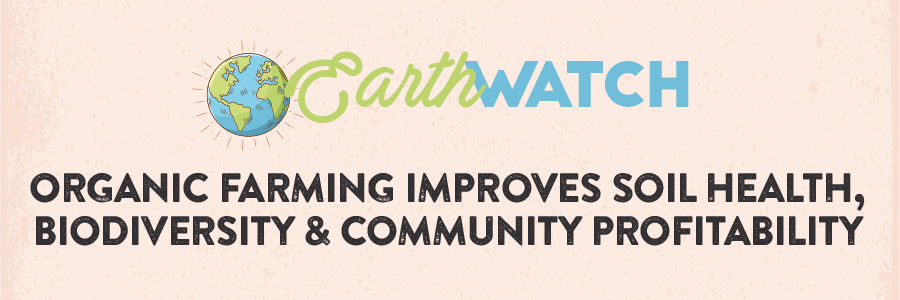


Sign-up for {N}power to get exclusive discounts, newsletters, members-only features, and more!
 Denver - Design District - Alameda and Broadway
Denver - Design District - Alameda and Broadway
368 S Broadway
Denver, CO 80209
United States
 Preferred Store:
Select a Store
Preferred Store:
Select a Store

Soil health, biodiversity, and a resilient economy are each vital elements for sustaining human life on this planet, and they also benefit significantly from the organic approach to farming. Let's take a trip around the world to explore recent organic research.

First, we’ll travel to Indonesia, the third-largest producer of cacao in the world, where researchers conducted a study, published in the journal Soil Biology, comparing soil microbes from organic and conventional cacao plantations. They found that biodiversity and abundance of bacteria and fungi were significantly higher in organic soil, reinforcing a mounting body of evidence showing that organic practices are beneficial to soil microbial health.1 2 A meta-analysis of 56 studies comparing organic and conventional soils, published in the journal PLOS One, adds some impactful perspective: it concluded that the activity and biomass of essential microbial elements were between 32 and 84 percent higher in organic soil.3
Microbial diversity is critical for soil fertility, nutrient cycling, and life as we know it.4 Soil with a robust microbial population results in healthier crops and is better at retaining water, resisting erosion, and minimizing nutrient runoff .5 Next stop, Nicaragua, where researchers compared the quantity and variety of birds between conventional and organic or traditional shadegrown coffee plantations. The study, published in the journal Agricultural Sciences, found that organic and traditional polyculture systems (growing a diverse range of crops) supported the greatest diversity and abundance of bird species. They also determined that the most critical “predictor of bird density” was the complexity of vegetation in organic and traditional polyculture settings that are absent on conventional, monoculture coffee farms.6 7 Diversity of vegetation provides both nesting habitats for birds and also supports a healthy insect population that provides food for birds. This study supports prior research, consistently showing that birds thrive on organic farms in higher quantities compared to conventional.8 9
Birds are an indispensable part of the food web, and key indicators of ecosystem health. Birds can tell us a lot about habitat quality and health because they are sensitive to the environment's unique features.10 Birds also provide valuable services to farmers, especially pest control and pollination.11 12
And, finally, let’s travel to Turkey to take a look at organic apple production. A study, published in the journal Acquisition Arboriculture, comparing conventional and organic apple groves in Turkey yielded impressive results. Total energy consumption in organic operations was lower, while their use of renewable energy sources was considerably higher: 30 percent versus 13 percent for conventional. Organic producers also emitted significantly fewer greenhouse gases, and the benefit cost ratio was better, meaning that organic apples were more profitable for farmers—all of this with comparable apple yields!13 14 A U.S. study on organic hotspots provides further evidence of organic agriculture’s economic benefits, including a $2,000 increase in median household income in counties with higher levels of organic agricultural activity.15 Energy, emissions, and the economy all benefit from organic farming! Industrial agriculture has taken a massive toll on the climate and small farmers.16 The good news is that organic agriculture offers positive solutions in all these areas.
If you're already a supporter of organic farming's benefits, tell your friends, family, and neighbors why. If you're a skeptic, challenge yourself to find an agricultural system that does more for the environment, starting with the soil beneath your feet. And, if you feel like you don't know enough to have an opinion, we have many resources to kick-start your journey of understanding what organic certification means. Just ask. Remember, as the oft-repeated Wendell Berry quote goes: "Eating is an agricultural act."



Sign-up for {N}power to get exclusive discounts, newsletters, members-only features, and more!
